
Paraplanners from all over the country gathered for The Big Day Out 2023 on 14th September 2023.
For the second successive year, our destination was the fantastic FarmED – right in the heart of the Cotswold countryside.
(Trust us, it’s lovely.)
This year, The Big Day Out was split into two halves:
1st half: All about paraplanning today
2nd half: All about paraplanning tomorrow

Three groups
Following The Big Welcome, we split the Assembly into three groups – Barley, Oats, and Wheat.
Each group had paraplanning hosts. Hosts volunteered to make sure you were where you needed to be when you needed to be there and to help facilitate conversations.
(The Big Day Out wouldn’t have been possible without our volunteers, so please gave a big hand 👏 to this year’s hosts: Kez Condy, Becky Jones, Jackie Manning, Sian Davies Cole, Pippa Oldfield, Jo Parkes, and Colin Stewart.)
First half: Paraplanning today – Crop Rotations
Each group spent 45 minutes in each of the following three sessions.
Technical top tips
Expert: Les Cameron, Head of Technical, M&G Wealth
This was a chance to quiz a popular Assembly regular in person with those burning technical questions that you’ve always wanted someone to answer.
Suitability reports: a fair value assessment
Leader: Caroline Stuart, Founder of Sparrow Paraplanning
Caroline invited groups to consider whether suitability reports were still fit for purpose and they’ve for a Consumer Duty world.
Were our planning assumptions still fit for purpose?
Leader: Dan Atkinson, Head of Technical, Paradigm Norton
Is it time to re-assess your planning assumptions? Could you really rely on what had happened in the past to plan for the future? This was a chance for participants to test the assumptions that apply to the ‘planning’ part of a paraplanners job title. To help, we were joined by three experts: Thomas Hogg of Timeline, Parmenion’s Jasper Thornton-Boelman and Jon Palin from Barnett Waddingham.

Lunchtime drop-in: Outsourced Paraplanners Banter + Chat x Paraplanners’ Assembly
Lunchtime drop-in: Outsourced Paraplanners Banter + Chat x Paraplanners’ Assembly
Christina Georgiou and Andy Schleider hosted a drop in for participants who are starting out as an outsourced paraplanner, thinking about it, or already are. The session was an IRL version of the ‘Outsourced Paraplanners banter + chat group’ hosted by Andy on WhatsApp.
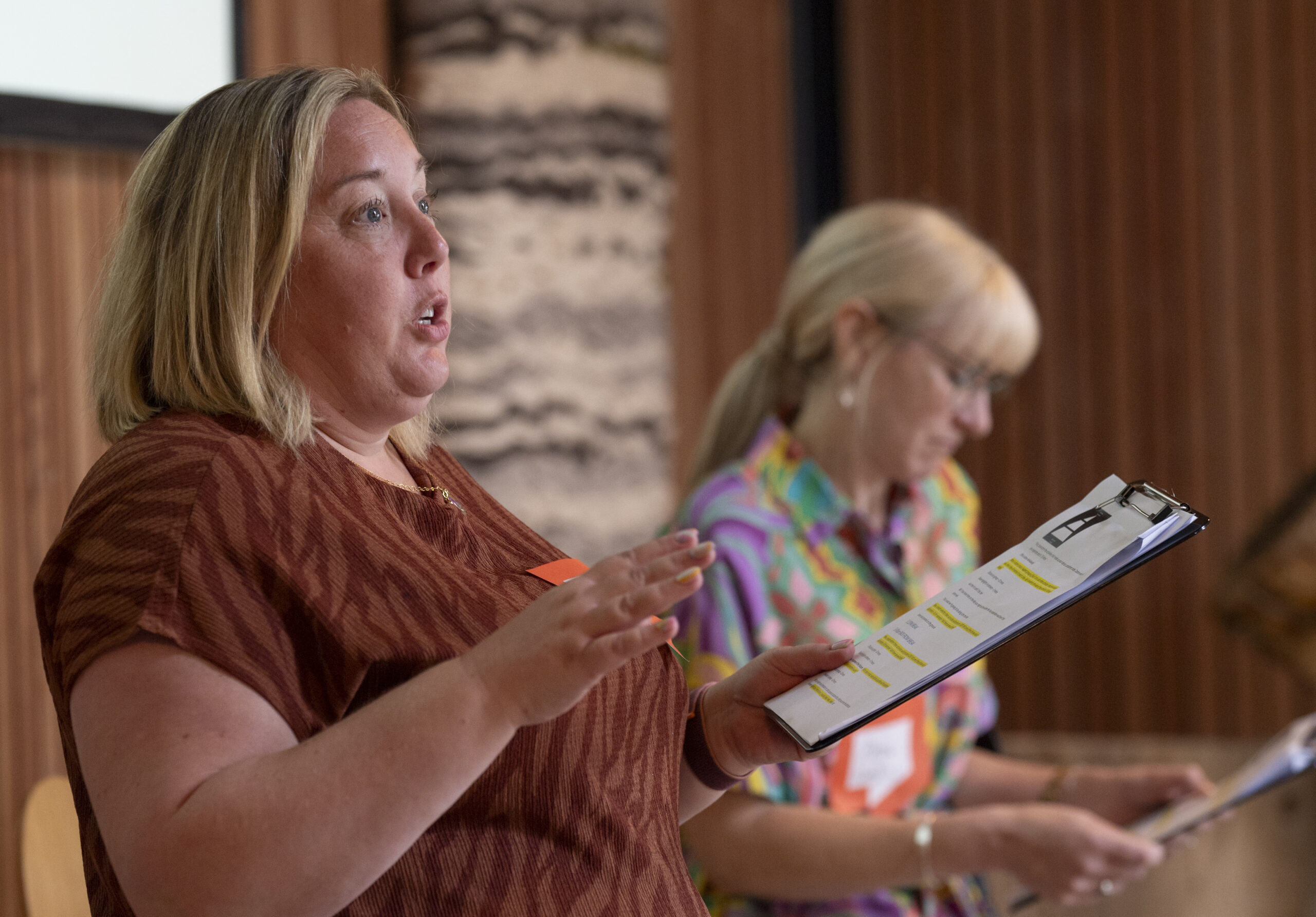

The Afternoon: Paraplanning tomorrow
After lunch, we got right back to the roots of the Paraplanners’ Assembly.
Back in 2013, our first gathering proved that when paraplanners get together to learn, fix and share, we’re able to tackle the biggest issues.
A decade ago, we wanted the financial planning world to recognise paraplanning as a choice of professional career. (And just look at us now!)
Today, the big questions seem to revolve around the future of paraplanning itself and our role in it.
What does artificial intelligence and automation mean for paraplanning and for us? Are remote working and hybrid teams really here to stay? What skills and knowledge are paraplanners going to need for a fulfilling career from now on?
Learn, fix and share
When we began to think about how to tackle these questions, it crossed our minds to invite a keynote speaker to put the world to rights for us.
But we soon realized that that speaker didn’t exist.
Because the future of work was not just about technology. It wasn’t just about personal development and technical knowledge. It wasn’t just about teams and leadership. It wasn’t just about the future of business.
It was too big a job for one person. But a bunch of people? Perhaps even an assembly?
And so we decided that the best people to consider the future of paraplanning were…paraplanners!
Let’s get started
Assembly hosts, Sam Tonks and Sarah Lees, kicked off the afternoon’s session.
We worked with foresight and innovation expert, Eleanor Winton, to help us design three very interactive sessions.
Eleanor recorded two video contributions that we showed to spark your thinking.
But the future of paraplanning? That conversation was up to us.
We knew from the surveys you completed that this kind of thing had been on your minds for a while. And we thought the Assembly was the perfect space for paraplanners to explore it. But you only got out what you were willing to put in, so you were ready to share your thoughts!
We were sure you were going to really enjoy it. We were sure you were going to feel good about having the chance to talk about the future. And we were certain it would be the start of a conversation that – thanks to your participation – our Assembly was uniquely placed to encourage among colleagues across the world of financial planning.
(And, besides, we arranged ice-cream in the break to fuel conversations!)
If you were there, we hope you enjoyed it. If you weren’t, there’s always next year!






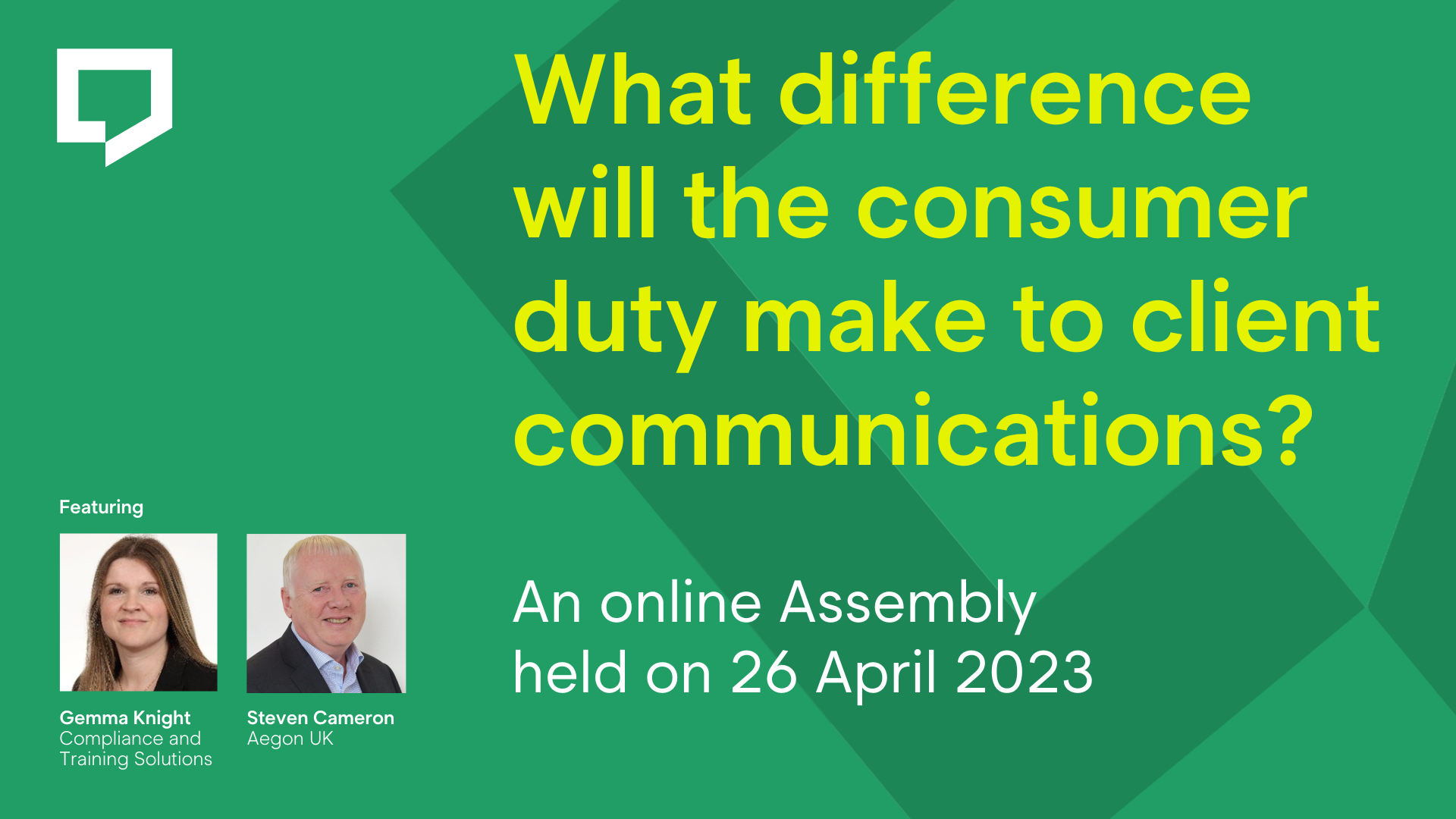
New consumer duty rules come into force on 31 July (for new products and services, that is).
Yet as recently as last month, Citywire reported that 59% of advisers have not started preparing for the July deadline – that’s according to a survey of 1,000 advice firms commissioned by Aviva.
It got us wondering: what’s going on in advice practices across the UK?
Are firms comfortable with the deadline because they’re confident they’ve got all the consumer duty bases covered?
Or could they be underestimating the effect the consumer duty rules will have on how we all communicate with clients?
What’s happening where you work? And with client communications at the heart of the Duty – and the role of paraplanners – should we be worried?
To explore what’s going on, we invited Aegon UK’s public affairs director, Steven Cameron, and Gemma Knight, a director of Compliance and Training Solutions (CATS), to join us online for a lunch-hour Assembly.
Is your firm ready for the 31 July deadline?
Watch the replay or listen to the podcast to find out!
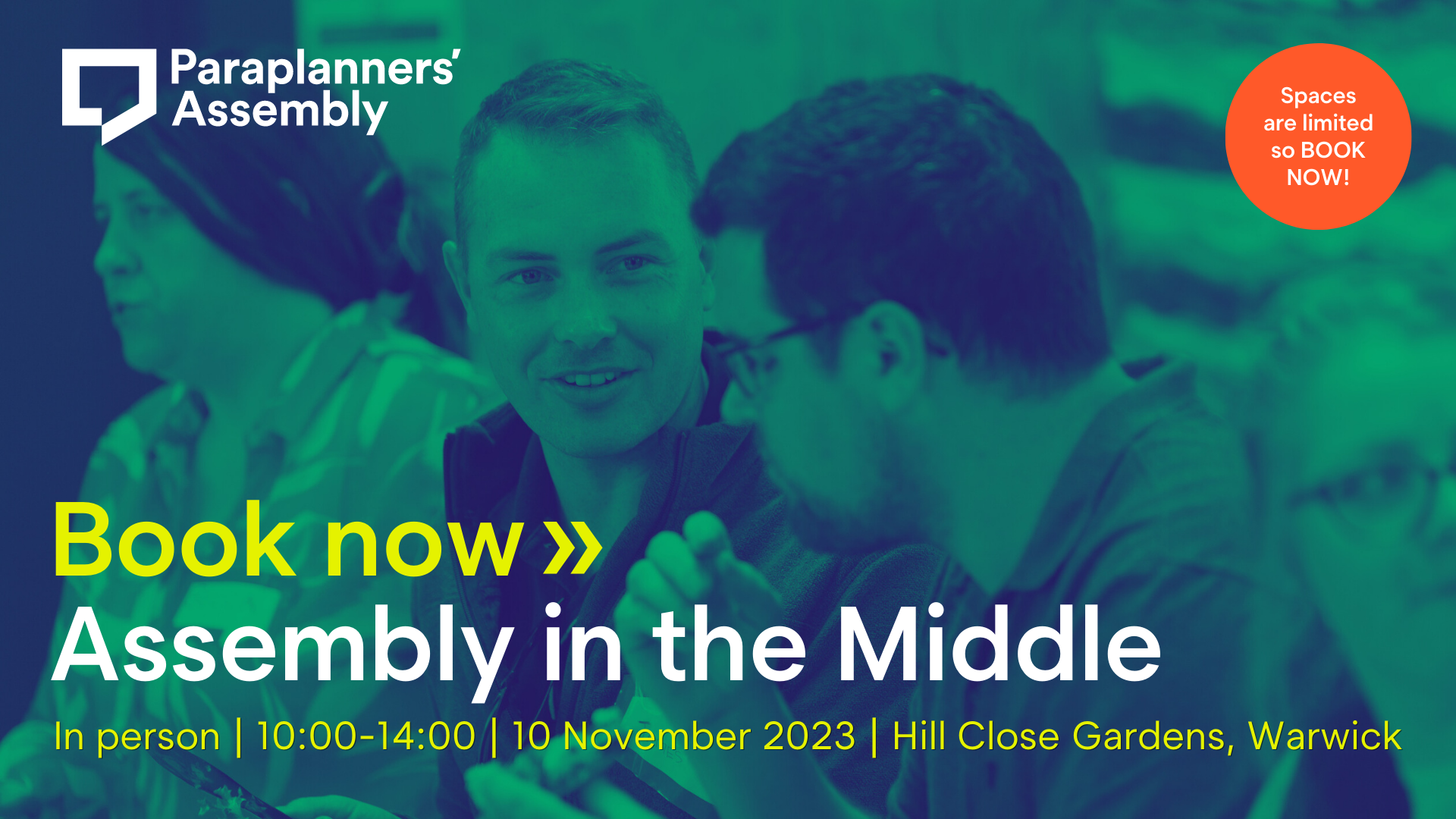
More than four years since it last gathered in person, Assembly in the Middle is back!
So if you’re a paraplanner who lives or works in the midlands of England, why not join organisers Caroline Stuart and Sam Tonks for an informal gathering at Hill Close Gardens in Warwick on 10 November 2023?
Assembly in the Middle will begin at 10am and finish at 2pm. But what happens in between is entirely up to you because, once you’ve booked your spot, we’ll invite you to submit ideas about what you’d like to learn, fix or share with other paraplanners on the day.
Why should I take part?
Because it’s part of the Paraplanners’ Assembly movement, Assembly in the Middle offers a supportive and encouraging space in which you can listen and learn, and share ideas, knowledge and insights.
And whether you’re in-house or outsourced, it’s a great way to meet other paraplanners from your neck of the woods – especially welcome when so many of us work from home these days.
It’s somewhere you can really focus and flourish – both professionally and personally.
Don’t forget to bring your lunch.
We’ll have coffee and tea and biscuits available throughout the day (plus chocolates, of course) but make sure you bring your own lunch or you’ll go hungry at lunchtime.
And finally…
You’ll feel you belong at an Assembly in the Middle because the Assembly in the Middle belongs to you.
Want to take part? Then tap ‘Book now’.
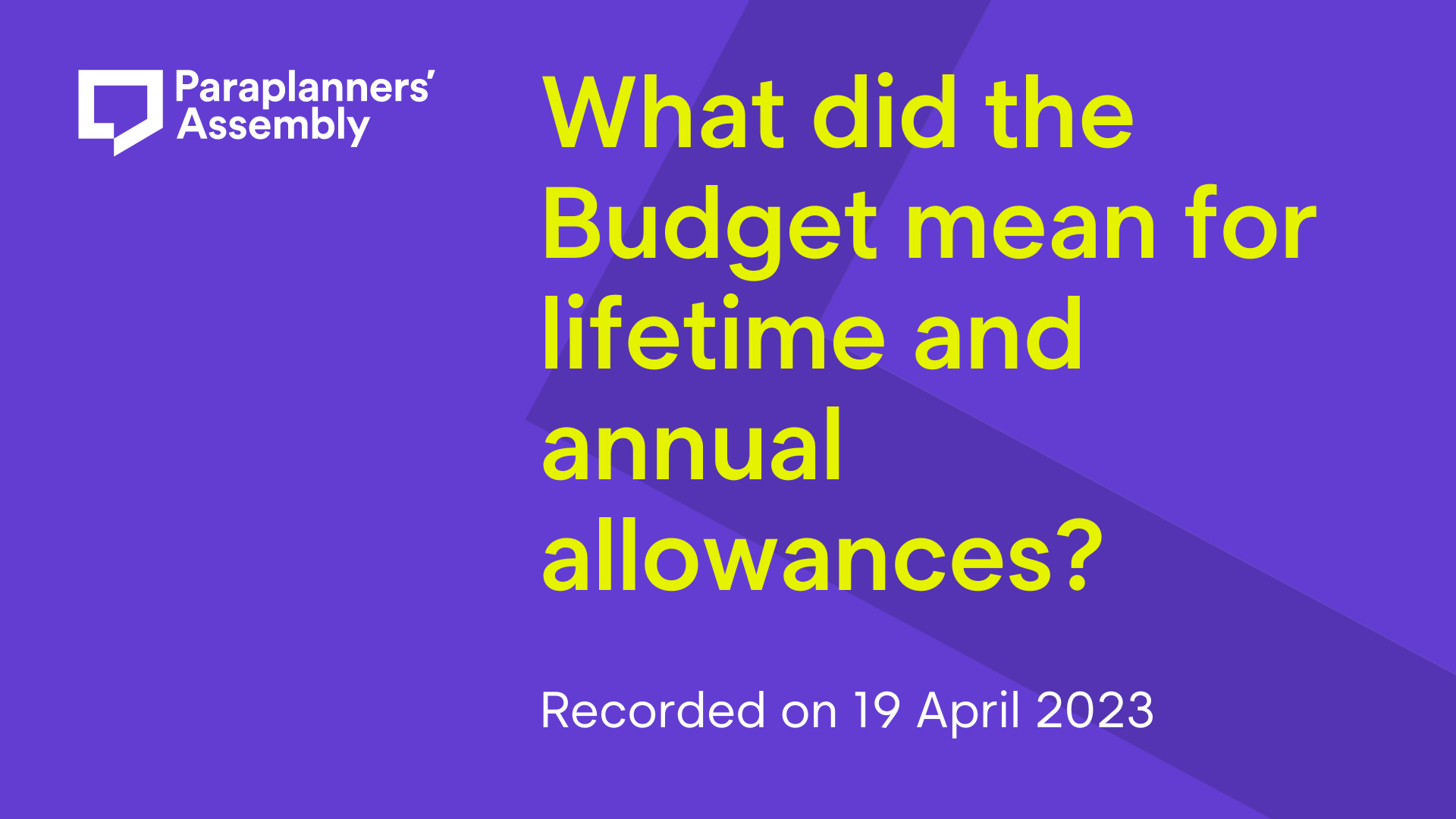
Les Cameron of M&G Wealth joined us to explore what the Budget in March 2023 meant for paraplanners, financial planners and clients.
Over the course of a lunch hour, as well as fielding questions from paraplanners in the chat, Les talked through the key financial planning questions of the Chancellor of the Exchequer’s statement.
In particular, Les tackled the changes to lifetime and and annual allowances and their consequences.
Scroll down to view the video replay or listen instead via our podcast.
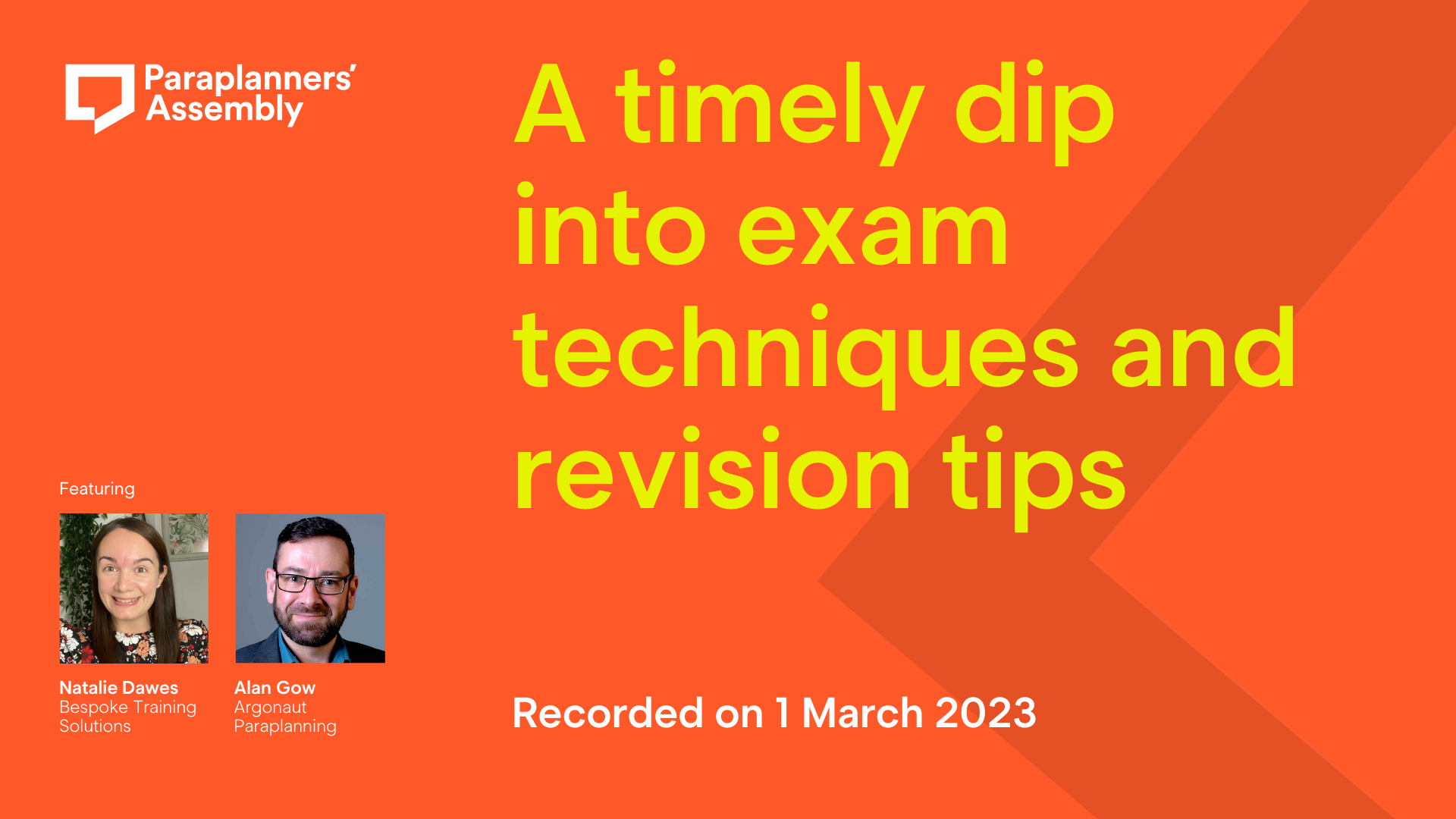
With examination season looming, we took a timely tour of the tips and techniques that could give you the edge in your exams.
Host, Richard Allum, was joined by two guests:
Natalie Dawes is an Academy Support Adviser with Bespoke Training Solutions (or BTS). Natalie provides ‘side-by-side’ learning support that can be adapted to meet the different needs of candidates who are preparing for professional exams.
Not only is Alan Gow one of the UK’s most experienced outsourced paraplanners but, as a Chartered Financial Planner, Fellow of the Personal Finance Society and a CISI Accredited Paraplanner, the Argonaut Paraplanning founder knows a thing or two about about qualifications and how to achieve them.
During the one-hour lunchtime Assembly, Natalie and Alan shared insights into revision tips and exam techniques that have worked for them or the candidates they work with.

Big reductions in allowances for capital gains tax and dividends announced in last November’s autumn statement invite the question: should we be re-thinking how we use investment bonds and GIAs?
In this lunchtime Assembly online, we were joined by Les Cameron from M&G Wealth to dig into the topic and consider the consequences for paraplanning of the changes.
Over the course of the hour we covered:
- the tax landscape and recent changes
- how the internal tax on investment bonds works
- pros and cons of each tax wrapper
- planning opportunities before and after tax year end
- how rebalancing, bed and ISA, DIMs and self assessment fit into planning
We concluded by taking a look at M&G’s new tax wrapper comparison tool.
Listen to this Assembly
As you can see below, we’ve published this Assembly as our latest podcast episode. Because Les is talking about the contents of a presentation, it’s definitely worth downloading his slidedeck (opens in PowerPoint online) and following along if you can.
Today, we’ve published our most recent online Assembly on getting in the right headspace for tax year end as our very first podcast episode.
From now on, we’ll be publishing a podcast edition after each online Assembly – as well as bonus content from time to time.
In addition to the library of videos from more than 100 online Assemblies, it’s another way in which the Assembly hopes – no matter whether you’re a contributor or listener – you’ll be able learn things, fix things and share things that help you become the paraplanner you want to be.
Where can I find the podcast?
It may take a while for episodes to appear on your favourite podcast app but you can already find us on Spotify – and we’ve popped the episode below for good measure. (Depending on the privacy settings you accepted for our site, you may need to click a ‘Load content’ button for the Spotify player to appear.)
What’s in this episode?
Our first podcast episode features the conversation from our recent Assembly on getting in the right headspace for tax year end. Facilitated by Becca Timmins, the discussion involved guests with loads of in-house and outsourced paraplanning experience between them: Zoe Hitchcock from Crowe UK, Emery Little’s Satu Flynn, and Kez Condy and Jo Parkes from Navigatus.
With the upcoming tax year end deadline in mind, our guests tackled three questions:
- What went well at tax year end last year?
- What was a challenge?
- What will you take with you into this tax year end?
Tune in to hear paraplanners share their insights and experiences and perhaps you’ll pick up some ideas, tips and techniques you can apply to your own run in to this year’s tax year end.
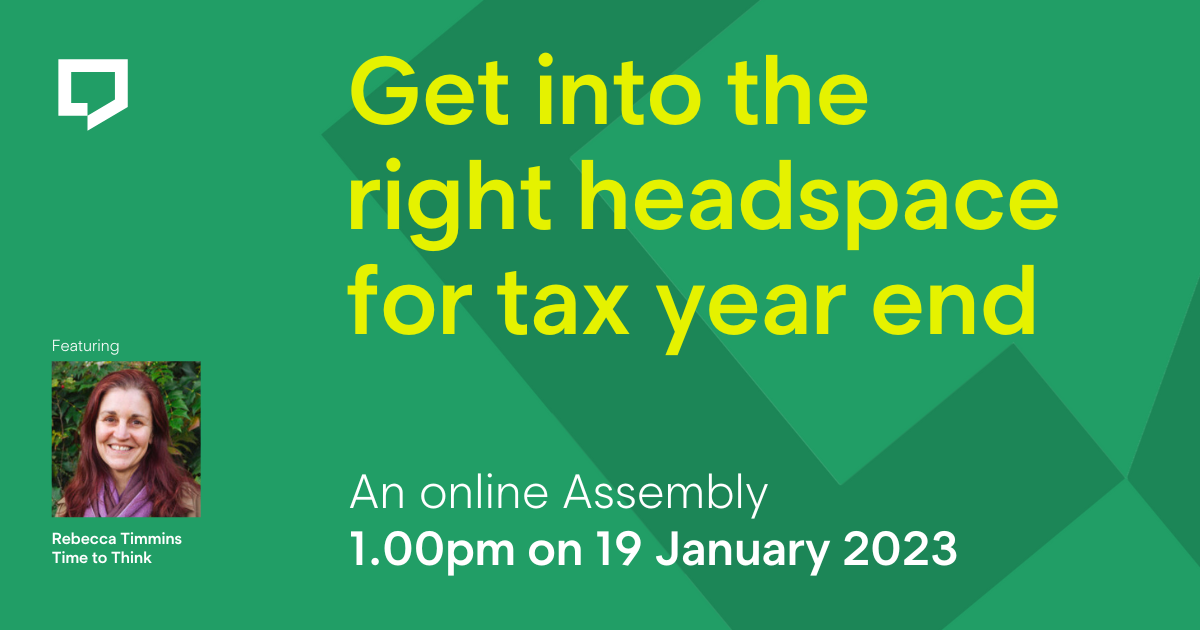
Tax year end. ALREADY?
Yes. But it wasn’t just any old hour’s worth of tax chat (attractive though we know that would be).
No. This is all about getting in the RIGHT MINDSET for 2023’s tax year end deadline.
(Like a HIIT workout. But without the HIIT bit. Or the workout.)
What it involved was coach and facilitator, Becca Timmins, being joined by Kez Condy and Jo Parkes from Navigatus, Zoe Hitchcock from Crowe UK and Emery Little’s Satu Flynn to discuss how they were getting in the zone for this year’s tax deadline.
The audience were invited to tune in as the group answer three questions:
- What went well at tax year end last year?
- What was a challenge?
- What will you take with you into this tax year end?
By sharing their insights and experiences from last year – combined with your own contributions in the chat – everyone taking part – on screen or off it – gained ideas, tips and techniques that could prove invaluable in countdown to the tax year deadline.
Far from being ‘soft’ skills, the ability to listen more effectively, give and receive feedback more confidently, and manage your time more productively are vital personal development skills so you can succeed in your paraplanning career.
But how often do you find time to discover, practice and apply new tools and approaches to fine-tune those skills? Plus do that alongside other paraplanners in the same boat as you?
If that sounds familiar, then this is the event for you. Because we asked coach and facilitator, Becca Timmins, to design a workshop exclusively for paraplanners.
Drawing on a decade of insights provided by Assembly participants, Becca has created the power-up you need to grow your confidence and command of these crucial skills – in just three hours.
This workshop has been made possible thanks to the kind support of our friends at Aegon UK.
What you’ll learn
You’ll learn to lean in to listening
Ever feel the need to fix everyone’s problems for them? Or perhaps you feel pressure to come up with solutions when people share their thoughts and feelings with you?
Learning a new way to think about listening can really help us let go of needing to have all of the answers. Plus, it makes for solutions that are more effective and better thought through. We’ll use our time to discover a refreshing approach to listening.
You’ll feel more confident about feedback
Do you ever feel unsure about how best to give feedback? Perhaps you struggle to get your point across and wish you could articulate yourself more clearly? Maybe receiving feedback makes you squirm?
We’re often not taught how to give effective feedback and so we struggle to know how to do it well. What’s more, bad experiences can put us off trying. So we’ll spend some time learning tools that can help us – and think about how we can get out of our own way.
You’ll gain a new perspective on time
Does it feel like there aren’t enough hours in the day? Maybe you feel like you never seem to have control over how you spend your time?
There are so many tools and hacks out there to try and make us feel we can do more in less time. Perhaps it’s time to think about it a bit differently? That’s why we will set some valuable time aside to explore the way we approach time managing.
About workshop facilitator, Becca Timmins
Our workshop will be led by Becca Timmins.
Becca’s workshops give you lots of room to reflect on things both individually and in conversation with other paraplanners.
Her style makes for an energising and enriching learning experience. In fact, you can see for yourself because we’ve added a few shots from Becca’s sessions at this year’s Big Day Out.
Coach and facilitator Becca has not only worked as a paraplanner in the past but – these days – is director of operations at financial planning practice Emery Little.


How to join the event
The event will be taking place online using Zoom. Once you’ve bought your ticket, you’ll receive the Zoom link and details of how to join the event on 12 May 2023.
Price
£25 per participant. This includes VAT and Eventbrite booking fees.
How to book
Just tap the Buy tickets button and book online now.
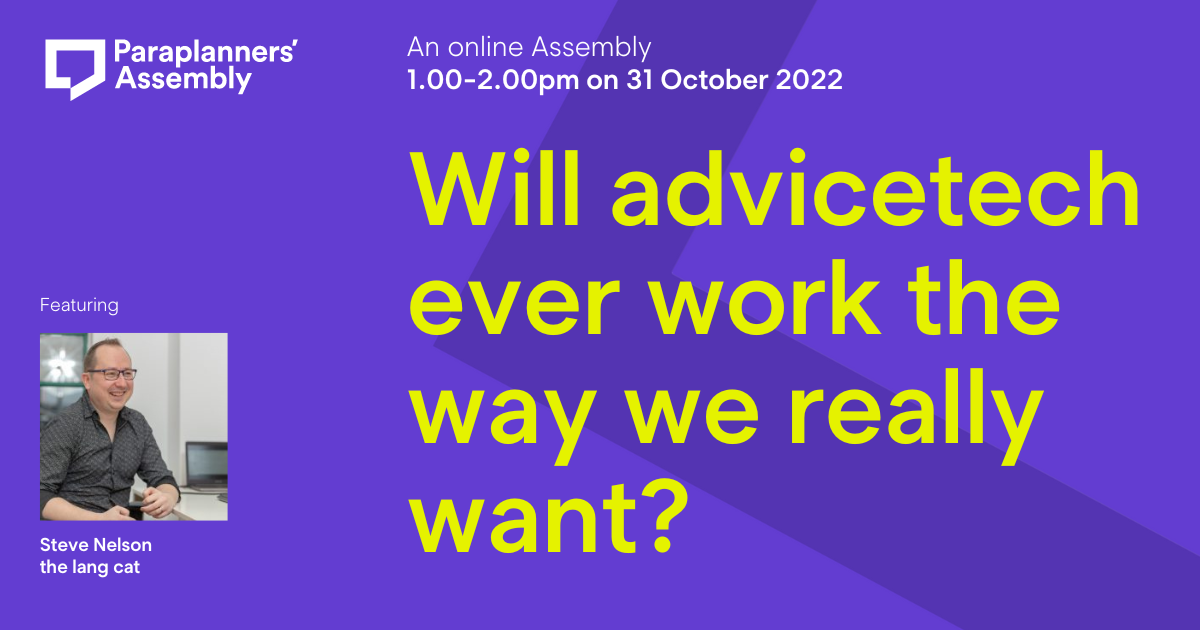
Is advicetech getting any better at helping advice professionals deliver a great advice experience to clients? Or are we destined for a future in which we struggle to get platforms, services and software to work the way we really want?
That’s what platforms, pensions and investments consultancy, the lang cat, wondered. That’s why they spoke to paraplanners, advisers and administrators for their latest report – A Fragmented World – published late last month.
The report combines findings from in-depth interviews with nearly 40 financial planning firms with responses to a comprehensive online survey completed by scores of financial advice professionals.
But will the lang cat’s findings chime with your own day-to-day experience of advicetech?
To find out, watch the replay of this online Assembly where the lang cat’s insight director, Steve Nelson, shares what they learned – and what it means for paraplanners and your use of advicetech in future.
From now on, there’s no need to visit Crowdcast to save your spot at an online Assembly. Just tap ‘Book event’ and follow the step-by-step instructions.
Broken link or duff information?
If something’s not quite right on this page, please tell us what you spotted now at our bug list.



